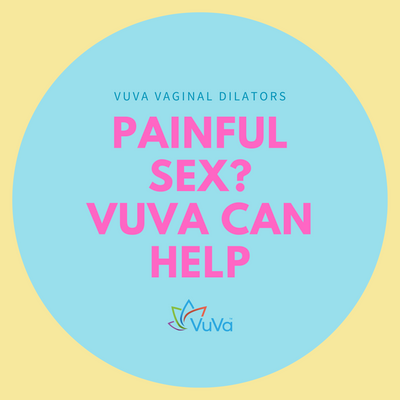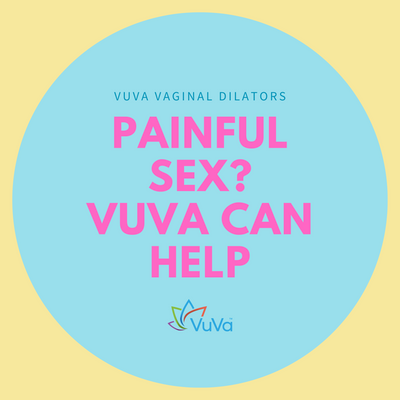
| Tara Langdale
What is the success rate of vaginal dilators? Will they help me with my painful sex condition?
The success rate of vaginal dilators can vary depending on various factors such as the underlying condition/disorder being treated, the individual's adherence to the treatment plan (most important), and the guidance and support provided by healthcare professionals or pelvic floor physical therapist. Vaginal dilators are commonly used in the treatment of conditions such as vaginismus, vaginal atrophy, dyspareunia (painful intercourse), vaginal stenosis, and post-surgical vaginal scarring.
Vaginal dilators are medical devices designed to gradually stretch and expand the vaginal muscles and tissues. They come in different sizes and shapes to accommodate individual needs and comfort levels. The primary goal of using vaginal dilators is to increase the flexibility, elasticity, and capacity of the vaginal canal.

The specific success rate of vaginal dilators can be difficult to quantify precisely due to the lack of standardized research studies specifically focused on this topic. However, anecdotal evidence and clinical experience suggest that they can be effective in improving symptoms and restoring sexual function for many individuals.
A study published in the Journal of Sexual Medicine examined the use of vaginal dilators in women with vaginismus. The study found that after six months of using vaginal dilators as part of a comprehensive treatment program, 75% of participants reported significant improvement in their ability to have pain-free intercourse. Another study published in the International Urogynecology Journal evaluated the use of dilators in women with vaginal stenosis following radiation therapy for gynecological cancer. The JSM study reported a success rate of 80% in terms of achieving successful vaginal penetration.
It is important to note that success rates may vary depending on individual factors such as the severity of the condition, psychological factors, previous trauma, and overall health status. Additionally, it is crucial for individuals using vaginal dilators to receive proper guidance from healthcare professionals who specialize in sexual medicine or pelvic floor therapy.
Painful sex, also known as dyspareunia, is a common condition that affects women of all ages. It refers to persistent or recurrent pain experienced during sexual intercourse. The exact number of women who suffer from painful sex can vary depending on various factors such as the population studied, the definition of painful sex used, and the methodology employed in research studies.
According to a study published in the Journal of Sexual Medicine, it is estimated that approximately 8-21% of women experience painful sex at some point in their lives. This wide range reflects the variability in reported prevalence rates across different studies. The study also found that the prevalence of dyspareunia tends to decrease with age.
Another study published in the British Journal of Obstetrics and Gynaecology reported that around 7.5% of women aged 16-74 years in the United Kingdom reported experiencing pain during sexual intercourse. This study was based on a large-scale survey conducted among a representative sample of women in the UK.
The American College of Obstetricians and Gynecologists (ACOG) states that dyspareunia is a common problem affecting up to 20% of women. They emphasize that it is important for healthcare providers to address this issue and provide appropriate treatment options.
It is worth noting that painful sex can have various underlying causes, including physical, psychological, or both. Some common physical causes include vaginal dryness, infections, hormonal imbalances, endometriosis, pelvic inflammatory disease, and certain medical conditions such as vulvodynia or vaginismus. Psychological factors such as anxiety, stress, relationship issues, or a history of sexual trauma can also contribute to painful sex.
Treatment options for painful sex depend on the underlying cause and may include addressing any physical issues, such as using lubricants or hormone therapy for vaginal dryness, treating infections or medical conditions, or undergoing physical therapy. Psychological interventions, such as counseling or therapy, may also be beneficial in cases where psychological factors are involved.
VuVa Magnetic Vaginal Dilators vs. Placebo Dilators: A Double Blind Placebo Study
- Eighty percent (80%) of study subjects reported a decrease in overall pain after using the VuVa™ magnetic vaginal dilators.
- Subjects using the VuVa™ magnetic vaginal dilators experienced an average thirty percent (30%) decrease in pain levels on a standardized tampon test, which is a way to clinically measure pain associated with sexual intercourse.
- The cotton swab test evaluates eleven (11) different locations of the vulvar vestibule for pain. Eighty percent (80%) of the study subjects reported a decrease in the total number of locations after using the VuVa™ magnetic vaginal dilators.
- Subjects using the VuVa™ magnetic vaginal dilators experienced an average twenty eight percent (28%) decrease in pain levels using a standardized cotton swab test, which is a non-invasive measure of vaginal pain.
Overall anxiety associated with vaginal penetration is significantly decreased in all subjects.
Subjects report feeling more confident about their sexual health in the future after completing the study.
Subjects report that VuVa dilator therapy is not a painful treatment.
For Full Study CLICK HERE
Reference Publications:
1. Journal of Sexual Medicine - A peer-reviewed journal publishing research on various aspects of sexual medicine.
2. International Urogynecology Journal - A leading journal focusing on urogynecology and female pelvic floor disorders.
3. Mayo Clinic - A reputable medical organization providing reliable information on various health topics, including vaginal health and treatment options.
VuVa Helpful Links:
How do Neodymium Vaginal Dilators work?
7 Reasons for a Tight Vagina and How to Loosen
How to Relax Vaginal Muscles, Vaginismus & Sex
Vaginal Stretching - Keeping in Shape with Dilators
Do Dilators Really Work? Yes, and They can Improve Your Sex Life!
Shop for VuVa Vaginal Dilators
Tara Langdale Schmidt is the inventor of the VuVa Dilator Company. She has pelvic floor dysfunction herself and wanted to create a dilator set that is made in America that women can trust. VuVatech has been in business since 2014 and has helped over 50,000 women all over the globe. She patented the Neodymium Vaginal Dilator, that is clinically proven to help with blood flow and nerve pain.













